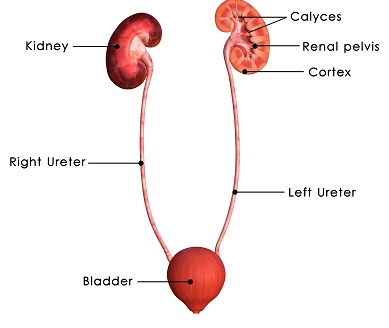 The kidneys have a very specialized job – every day, healthy kidneys filter and clean 120 to 150 quarts of blood, produce 1 to 2 quarts of urine to remove unwanted waste matter that the body does not need, keep electrolytes stable, and make hormones that help regulate blood pressure. Healthy kidneys allow urine to flows from the kidneys to the bladder through two thin tubes of muscle called ureters where it is stored until the bladder fills with urine and is ready to be emptied. Individuals with normal kidney function experience this process multiple times be day; however, patients with renal failure (kidney disease) require medical intervention to complete this process.
The kidneys have a very specialized job – every day, healthy kidneys filter and clean 120 to 150 quarts of blood, produce 1 to 2 quarts of urine to remove unwanted waste matter that the body does not need, keep electrolytes stable, and make hormones that help regulate blood pressure. Healthy kidneys allow urine to flows from the kidneys to the bladder through two thin tubes of muscle called ureters where it is stored until the bladder fills with urine and is ready to be emptied. Individuals with normal kidney function experience this process multiple times be day; however, patients with renal failure (kidney disease) require medical intervention to complete this process.
Renal Failure
Renal failure refers to temporary or permanent damage to the kidneys that result in loss of normal kidney function. There are several different types of renal failure:
- Acute renal failure has a sudden onset and is sometimes reversible. Early kidney disease can take on many symptoms that indicate damage or decreased function. Many people urinate less frequently and have foul smelling or dark urine along with blood or pressure when urinating.
- Chronic renal failure progresses slowly over at least three months and can lead to permanent renal failure. Symptoms affect every part of the body including nausea, vomiting, fatigue, muscle cramps, high blood pressure and swelling in the lower extremities.
- End-stage renal disease (ESRD) occurs when the kidneys permanently fail to work.
Risk Factors
Some people are at greater risk than others due to lifestyle, illness, or genetics:
- Type 1 or type 2 diabetes
- Glomerulonephritis
- High blood pressure
- Age 65 or older
- Obesity
- Family history of kidney failure
Renal Failure Treatment
Dr. Tilara can offer several treatment options, depending on the severity of a patient’s renal disease, aimed at optimizing and allowing dialysis to restore healthy filtration of the body. Dialysis is a procedure that is routinely performed on patients diagnosed with acute, chronic renal failure, or end-stage renal disease. The process involves removing waste substances and fluid from the blood that are normally eliminated by the kidneys. During a dialysis treatment, a machine pumps blood from your body by way of a flexible, plastic tube called a catheter, cleans it and then returns it to your body through a separate catheter tube.








